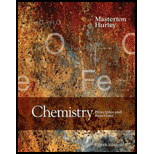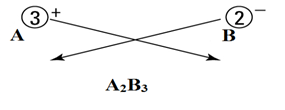
Chemistry: Principles and Reactions
8th Edition
ISBN: 9781305079373
Author: William L. Masterton, Cecile N. Hurley
Publisher: Cengage Learning
expand_more
expand_more
format_list_bulleted
Question
Chapter 2, Problem 59QAP
Interpretation Introduction
Interpretation:
To give all the formulas of compounds containing no other ions than K+, Ca2+, Cl-, S2-.
Concept introduction:
There are two types of ions:
Cations: These are positively charged ions formed by losing electrons.
Anions: These are negatively charged ions formed by gaining electrons.
Cations and anions combine to form ionic compounds.
Steps to write chemical formula from ions:
Let’s say we have two ions A+3 and B-2.
- Identify the cations and anions.
- Write both cation and anion together (placing cation first) as:
Cations are positively charged, and anions are negatively charged.
Here
A+3 = cation
B-2 = anion
- Put a value in the subscript of anion which is equal in magnitude with charge of cation and in the subscript of cation, put the value equals to magnitude of charge of anion as:

- If the subscript of anions and cations are multiple of a common number, then make it the smallest whole number ratio.
Expert Solution & Answer
Trending nowThis is a popular solution!

Students have asked these similar questions
Calculate the pH and the pOH of each of the following solutions at 25 °C for which the substances ionize completely:
(a) 0.200 M HCl
Calculate the pH and the pOH of each of the following solutions at 25 °C for which the substances ionize completely:
(a) 0.000259 M HClO4
What is the pH of a 1.0 L buffer made with 0.300 mol of HF (Ka = 6.8 × 10⁻⁴) and 0.200 mol of NaF to which 0.160 mol of NaOH were added?
Chapter 2 Solutions
Chemistry: Principles and Reactions
Ch. 2 - Atomic Theory and Laws State in your own words the...Ch. 2 - State in your own words the law of constant...Ch. 2 - Two basic laws of chemistry are the law of...Ch. 2 - Two basic laws of chemistry are the law of...Ch. 2 - Who discovered the electron? Describe the...Ch. 2 - Who discovered the nucleus? Describe the...Ch. 2 - Selenium is widely sold as a dietary supplement....Ch. 2 - Radon is a radioactive gas that can cause lung...Ch. 2 - How do the isotopes of argon, Ar-36, Ar-38, and...Ch. 2 - Consider two isotopes Fe-54 and Fe-56. (a) Write...
Ch. 2 - Uranium-235 is the isotope of uranium commonly...Ch. 2 - An isotope of americium (Am) with 146 neutrons is...Ch. 2 - Prob. 13QAPCh. 2 - Prob. 14QAPCh. 2 - Prob. 15QAPCh. 2 - See the definition for isobars in Question 15....Ch. 2 - Calculate the mass ratio of a bromine atom to an...Ch. 2 - Arrange the following in the order of increasing...Ch. 2 - Cerium is the most abundant rare earth metal. Pure...Ch. 2 - Consider the three stable isotopes of oxygen with...Ch. 2 - Bromine has two occuring isotopes: 79Br with...Ch. 2 - Rubidium has two naturally occurring isotopes:...Ch. 2 - Strontium has four isotopes with the following...Ch. 2 - Neon is an inert gas with three stable isotopes....Ch. 2 - Naturally occurring silver (Ag) consists of two...Ch. 2 - Copper has two naturally occurring isotopes. Cu-63...Ch. 2 - Silicon (averageatomicmass=28.0855amu) has three...Ch. 2 - Magnesium (averageatomicmass=24.305amu) consists...Ch. 2 - Zinc has four stable isotopes: Zn-64, Zn-66,...Ch. 2 - Chlorine has two isotopes, Cl-35 and Cl-37. Their...Ch. 2 - Lead is a heavy metal that remains in the...Ch. 2 - Silversmiths are warned to limit their exposure to...Ch. 2 - Determine (a) the number of atoms in 0.185 g of...Ch. 2 - For bismuth (Bi), determine (a) the number of...Ch. 2 - The isotope Si-28 has a mass of 27.977 amu. For...Ch. 2 - Myocardial perfusion imaging (MPI) is the latest...Ch. 2 - A cube of sodium has length 1.25 in. How many...Ch. 2 - A cylindrical piece of pure copper (d=8.92g/cm2)...Ch. 2 - Give the symbols for (a) potassium (b) cadmium (c)...Ch. 2 - Prob. 40QAPCh. 2 - Prob. 41QAPCh. 2 - Prob. 42QAPCh. 2 - How many metals are in the following groups? (a)...Ch. 2 - How many nonmetals are in the following periods?...Ch. 2 - Which group in the periodic table (a) has one...Ch. 2 - Which period of the periodic table (a) has no...Ch. 2 - Prob. 47QAPCh. 2 - Prob. 48QAPCh. 2 - Prob. 49QAPCh. 2 - Prob. 50QAPCh. 2 - Prob. 51QAPCh. 2 - Complete the table given below.Ch. 2 - Classify the following compounds as electrolytes...Ch. 2 - Prob. 54QAPCh. 2 - Prob. 55QAPCh. 2 - Prob. 56QAPCh. 2 - Prob. 57QAPCh. 2 - Write the names of the following molecules. (a)...Ch. 2 - Prob. 59QAPCh. 2 - Prob. 60QAPCh. 2 - Prob. 61QAPCh. 2 - Prob. 62QAPCh. 2 - Prob. 63QAPCh. 2 - Prob. 64QAPCh. 2 - Write the names of the following ionic compounds....Ch. 2 - Prob. 66QAPCh. 2 - Complete the following table.Ch. 2 - Complete the following table.Ch. 2 - Prob. 69QAPCh. 2 - Prob. 70QAPCh. 2 - Prob. 71QAPCh. 2 - Prob. 72QAPCh. 2 - Criticize each of the following statements: (a)...Ch. 2 - Which of the following statements is/are always...Ch. 2 - Some brands of salami contain 0.090% sodium...Ch. 2 - Carbon tetrachloride, CCl4, was a popular...Ch. 2 - Prob. 77QAPCh. 2 - Prob. 78QAPCh. 2 - Prob. 79QAPCh. 2 - Use the law of conservation of mass to determine...Ch. 2 - Prob. 81QAPCh. 2 - Prob. 82QAPCh. 2 - Scientists are trying to synthesize elements with...Ch. 2 - Write the nuclear symbol for the element whose...Ch. 2 - Prob. 85QAPCh. 2 - Write the atomic symbol for the element whose ion...Ch. 2 - Prob. 87QAPCh. 2 - Three compounds containing only carbon and...Ch. 2 - Ethane and ethylene are two gases containing only...Ch. 2 - Calculate the average density of a single Al-27...Ch. 2 - Prob. 91QAPCh. 2 - Each time you inhale, you take in about 500 mL...Ch. 2 - Hydrogen gas is prepared in a lab experiment. In...
Knowledge Booster
Similar questions
- Determine if the following salt is neutral, acidic or basic. If acidic or basic, write the appropriate equilibrium equation for the acid or base that exists when the salt is dissolved in aqueous solution. If neutral, simply write only NR. Be sure to include the proper phases for all species within the reaction. NaN₃arrow_forwardCan I please get help with this?arrow_forwardCan I please get help with this?arrow_forward
- Use the Henderson-Hasselbalch equation to calculate pH of a buffer containing 0.050M benzoic acidand 0.150M sodium benzoate. The Ka of benzoic acid is 6.5 x 10-5arrow_forwardA. Draw the structure of each of the following alcohols. Then draw and name the product you would expect to produce by the oxidation of each. a. 4-Methyl-2-heptanol b. 3,4-Dimethyl-1-pentanol c. 4-Ethyl-2-heptanol d. 5,7-Dichloro-3-heptanolarrow_forwardWhat is the pH of a 1.0 L buffer made with 0.300 mol of HF (Ka = 6.8 × 10⁻⁴) and 0.200 mol of NaF to which 0.160 mol of NaOH were added?arrow_forward
- Can I please get help with this.arrow_forwardDetermine if the following salt is neutral, acidic or basic. If acidic or basic, write the appropriate equilibrium equation for the acid or base that exists when the salt is dissolved in aqueous solution. If neutral, simply write only NR. Be sure to include the proper phases for all species within the reaction. N₂H₅ClO₄arrow_forwardPlease help me with identifying these.arrow_forward
arrow_back_ios
SEE MORE QUESTIONS
arrow_forward_ios
Recommended textbooks for you
 Chemistry: The Molecular ScienceChemistryISBN:9781285199047Author:John W. Moore, Conrad L. StanitskiPublisher:Cengage Learning
Chemistry: The Molecular ScienceChemistryISBN:9781285199047Author:John W. Moore, Conrad L. StanitskiPublisher:Cengage Learning Introductory Chemistry: A FoundationChemistryISBN:9781337399425Author:Steven S. Zumdahl, Donald J. DeCostePublisher:Cengage Learning
Introductory Chemistry: A FoundationChemistryISBN:9781337399425Author:Steven S. Zumdahl, Donald J. DeCostePublisher:Cengage Learning Chemistry & Chemical ReactivityChemistryISBN:9781133949640Author:John C. Kotz, Paul M. Treichel, John Townsend, David TreichelPublisher:Cengage Learning
Chemistry & Chemical ReactivityChemistryISBN:9781133949640Author:John C. Kotz, Paul M. Treichel, John Townsend, David TreichelPublisher:Cengage Learning Chemistry: Principles and PracticeChemistryISBN:9780534420123Author:Daniel L. Reger, Scott R. Goode, David W. Ball, Edward MercerPublisher:Cengage Learning
Chemistry: Principles and PracticeChemistryISBN:9780534420123Author:Daniel L. Reger, Scott R. Goode, David W. Ball, Edward MercerPublisher:Cengage Learning Introductory Chemistry: An Active Learning Approa...ChemistryISBN:9781305079250Author:Mark S. Cracolice, Ed PetersPublisher:Cengage Learning
Introductory Chemistry: An Active Learning Approa...ChemistryISBN:9781305079250Author:Mark S. Cracolice, Ed PetersPublisher:Cengage Learning ChemistryChemistryISBN:9781305957404Author:Steven S. Zumdahl, Susan A. Zumdahl, Donald J. DeCostePublisher:Cengage Learning
ChemistryChemistryISBN:9781305957404Author:Steven S. Zumdahl, Susan A. Zumdahl, Donald J. DeCostePublisher:Cengage Learning

Chemistry: The Molecular Science
Chemistry
ISBN:9781285199047
Author:John W. Moore, Conrad L. Stanitski
Publisher:Cengage Learning

Introductory Chemistry: A Foundation
Chemistry
ISBN:9781337399425
Author:Steven S. Zumdahl, Donald J. DeCoste
Publisher:Cengage Learning

Chemistry & Chemical Reactivity
Chemistry
ISBN:9781133949640
Author:John C. Kotz, Paul M. Treichel, John Townsend, David Treichel
Publisher:Cengage Learning

Chemistry: Principles and Practice
Chemistry
ISBN:9780534420123
Author:Daniel L. Reger, Scott R. Goode, David W. Ball, Edward Mercer
Publisher:Cengage Learning

Introductory Chemistry: An Active Learning Approa...
Chemistry
ISBN:9781305079250
Author:Mark S. Cracolice, Ed Peters
Publisher:Cengage Learning

Chemistry
Chemistry
ISBN:9781305957404
Author:Steven S. Zumdahl, Susan A. Zumdahl, Donald J. DeCoste
Publisher:Cengage Learning